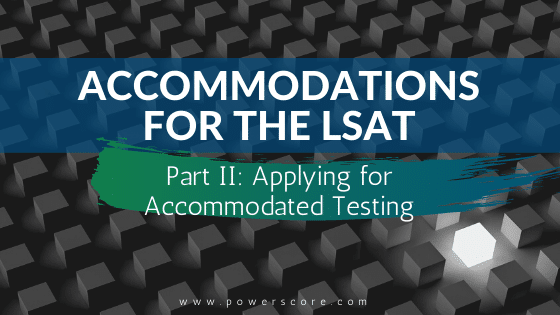In Part 1 of this series on LSAC test taking accommodations and the LSAT, we discussed various test takers who might require special accommodations for their LSAT administrations, as well as some of the kinds of test-taking accommodations granted by the LSAC. In this installment we look at the application process for special accommodations.
LSAC strongly encourages you to submit all of your documentation as early as possible to ensure the maximum amount of time for consideration. In other words, while they do encourage test-takers with documented disabilities to apply for such accommodations, this should never be a last-minute consideration on the part of the applicant; the application for accommodated testing requires significant and varied documentation, collected from sources including health care providers, educational testing experts, family members, pre-law advisors and others. All of the required forms can be downloaded here.
Requests for accommodations will not be reviewed until you are registered for the LSAT and all of the following are received by LSAC:
- an LSAT Candidate Form;
- an Evidence of Disability Form completed by a qualified/licensed professional who is familiar with the impact of your disorder/condition on a major life activity that affects your ability to perform on the LSAT or other similar, timed, standardized admission tests;
- a Statement of Need Form completed by the candidate and providing various information. Might not be necessary in some cases.
The following checklists are provided by the LSAC to ensure that all required information is submitted:
Automatic Approval Based on Prior Approval of LSAT Accommodations:
- If you previously received LSAT accommodations, you get them again.
- If you change your request, then you must submit new forms.
LSAT Accommodation Request Based Solely on Prior Accommodations on Certain Other Standardized Postsecondary Admission Tests:
- If you have previously taken a qualifying exam (such as the SAT, ACT, GRE, or GMAT) and received accommodations, LSAC will approve identical accommodations.
- You will need to submit at least the Candidate Form and provide proof of prior accommodation.
- If you request different accommodations, you will need to submit additional forms.
Other Requests:
- LSAC classifies other requests into three numbered categories.
- Category #1 are requests NOT involving extra time. You must submit all three main forms.
- Category #2 are requests involving up to 50% extra time; or up to 100% extra time if you have a visual impairment. You must submit all three main forms.
- Category #3 are requests involving more than 50% extra time; or more than 100% extra time if you have a visual impairment. You must submit all three main forms.
What Happens Next?
Once the LSAC has received your application for accommodated testing, they establish your file (keep in mind that LSAC staff cannot review your documentation until you have registered to take the LSAT). If any information is missing, they will let you know; otherwise the LSAC will review your application and notify you of your status by email. Possible status of an application includes File Under Review, Approved for Testing Accommodations, Incomplete, Not Registered for the LSAT, Denied, or Accommodated Request Received Too Late.
This is an involved process that takes time—so the earlier you start, the better. Before they can even begin to assess your situation, you must assemble the necessary certifications and complete the accommodations application. And remember, you must register for the LSAT before your application for accommodated testing will be considered. The LSAC welcomes any questions regarding their accommodations request process—you can call them at 215-968-1001. You can also read the LSAC brochure on the subject and download the Accommodations Request Packet here.


Thomas Honnold says
what address should I mail my completed forms too?
Dave Killoran says
The addresses are listed near the bottom here: https://www.lsac.org/lsat/lsac-policy-accommodations-test-takers-disabilities
Good luck!